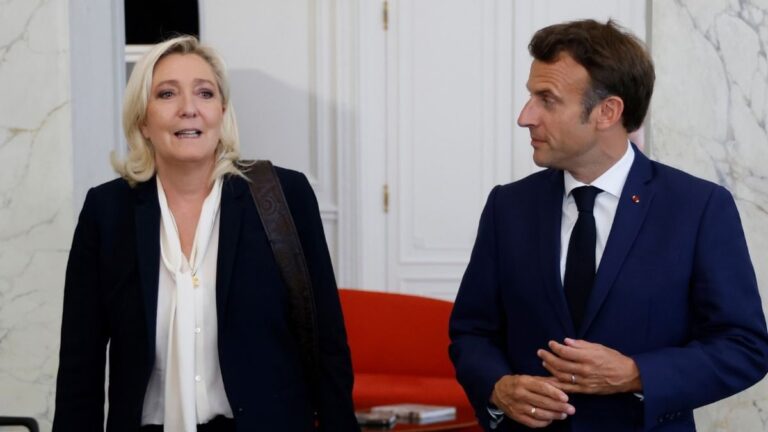Emmanuel Macron is in a difficult position after his rival Marine Le Pen of the far-right Rally National party won the first round of France’s snap parliamentary elections. Following his recent defeat in the European Parliament elections, Macron has called for two general elections for June 30 and July 7.
Paris has already seen unrest, with protesters taking to the streets, setting shops on fire and engaging in violence ahead of the 2024 Olympics. The Daily Mail reported the scale of violence as protesters took to the Place de la Republique.
Why did Macron call a sudden general election?
Macron did not need to announce early elections for at least another three years, but after his Renew coalition suffered a crushing defeat in the June 9 European Union elections to the far-right Rally National of Jordan Bardella and Marine Le Pen, he said on television that “we cannot act as if nothing happened,” French media reported. BBC.
Macron has pledged to serve out his final term as president, which runs until 2027, but now faces the possibility of having to appoint a prime minister from the opposition in an unusual arrangement known as “coexistence”.
Macron had been hoping to break the deadlock after his party failed to secure a majority in the National Assembly in June 2022. He had to force through pension reform without a vote and needed the backing of the National Rally to toughen immigration laws. “We need a clear majority for France to act calmly and harmoniously,” he said.
The centrist Ensemble coalition, made up of Renaissance, Horizon and Modem parties, is struggling in the polls against the hastily formed left-wing New Popular Front, made up of the Socialists, the Greens, the Communists and the far-left Indefatigable France (LFI).
How are French elections conducted?
The National Assembly has 577 seats, including the 13 overseas regions and 11 constituencies that represent French citizens living abroad. A party needs 289 seats to win an absolute majority.
Macron’s coalition had just 250 seats in the outgoing parliament and needed to win support from other parties every time to pass legislation.
In the first round, any candidate who does not receive the support of 12.5% of local voters is eliminated. A candidate who receives at least 50% of the vote with at least a quarter of local voters turning out automatically wins.
The second round is a series of runoff elections between two, three or possibly four candidates.
Why are elections important?
The Rally National party could take power for the first time. It is led in parliament by 28-year-old Jordan Bardella and Marine Le Pen, who has previously run for president three times but lost each time.
She’s also keeping her eye on the next presidential election in three years.
How did the first round go?
Penn’s far-right National Rally party won the first round of the general election on June 30. The party received about 34% of the vote, beating the second-placed Left Alliance (28.1%). Meanwhile, Macron’s party came in a distant third with 20.3%.
Moreover, projections suggest that after the second round of voting on July 7, the National Coalition will win between 230 and 280 seats in the 577-seat National Assembly, falling short of the 289 seats needed for an absolute majority. CNN.
The result puts the RN in a position to consider forming a government, but other political forces have signalled they will work together to block far-right parties in the second round.
What does a win for RN mean?
A victory for the National Rally could usher in an era of “coexistence” in which far-right parties coexist with President Macron and pursue policies that differ from Macron’s centrist policies. It would be the first time since World War II that far-right forces have taken power in France.
What does it mean for Macron?
Macron called for a “broad” coalition to tackle the far-right in the second round, a runoff election between two or three candidates who did not emerge as a clear winner in the first round.
Macron said the high turnout in the first round showed “the importance of this vote for all citizens and the desire to define the political situation”.
He also underestimated how much his political capital had diminished after seven years in power.
“He portrayed the election as a contest between moderates and extremists of the left and right, but ultimately failed to impress voters, making his side the weakest of the three factions vying to govern France,” the report said. France 24.
When did cohabitation begin in France?
Parliamentary elections are held immediately after presidential elections, and voting trends have changed little over the past 20 years. There have been three instances of cohabitation in France.
1997-2002Socialist Lionel Jospin served as prime minister under centre-right President Jacques Chirac.
1993-95Centre-right Prime Minister Édouard Balladur worked alongside Socialist President François Mitterrand during his second term.
1986-88Jacques Chirac served as Prime Minister under President François Mitterrand.
But France is in no way prepared for the coexistence that may occur after July 7.
Top Videos
Show all
Leader of Opposition in Indian Lok Sabha Rahul Gandhi slams BJP, equates Hindus with ‘violence’
TMC News | West Bengal News | Viral Video in West Bengal | TMC distances itself from viral video
First case registered under new criminal law ‘Bharatiya Nyaya Sanhita’ against street vendor in Delhi
BCCI Announces Prize Money of Rs 1,250 Crore for T20 World Champions Team India | T20 World Cup | New18
Eight arrested, including mastermind in Guwahati result sheet tampering case | News18
What happens if no party wins an absolute majority?
According to the constitution, the prime minister is appointed by the president, so Macron is expected to offer the position to the leading party. If no party wins an absolute majority, a caretaker government would take over basic government duties. But Macron would have to navigate a complicated political situation.
First revealed: 01 July 2024 15:27 IST

